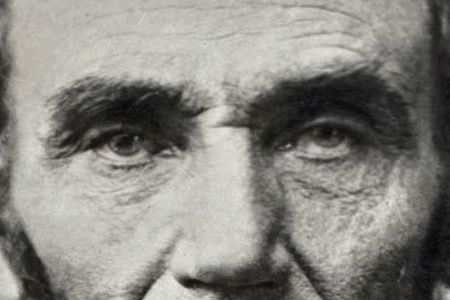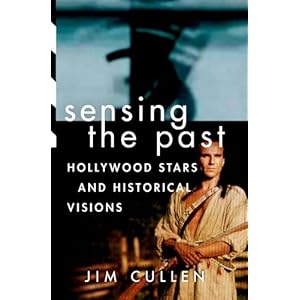Daniel Day-Lewis's Abe Lincoln: (Racial) Trailblazer
Related Links

HNN Hot Topics: "Lincoln": The Movie

Credit: Wiki Commons.
 Though I enjoyed writing my forthcoming book Sensing the Past more than any I've undertaken in many years, there was an element of desperation in my desire to finish it quickly. The project, which looks at visions of history in the career choices of powerful Hollywood actors, was originally sparked by the work of actor Daniel Day-Lewis, in which I discerned a surprising pattern. The problem was that I knew fairly early on that Day-Lewis was preparing to star in a new movie about Abraham Lincoln, and everything I could see about that project suggested it was going to subvert my cherished little theory. So I wanted to get the book done and out around the time the movie was released -- both so I could ride its coattails, and also so I could escape a requirement to explain it. If I was lucky, that would be my problem in a preface for the second edition.
Though I enjoyed writing my forthcoming book Sensing the Past more than any I've undertaken in many years, there was an element of desperation in my desire to finish it quickly. The project, which looks at visions of history in the career choices of powerful Hollywood actors, was originally sparked by the work of actor Daniel Day-Lewis, in which I discerned a surprising pattern. The problem was that I knew fairly early on that Day-Lewis was preparing to star in a new movie about Abraham Lincoln, and everything I could see about that project suggested it was going to subvert my cherished little theory. So I wanted to get the book done and out around the time the movie was released -- both so I could ride its coattails, and also so I could escape a requirement to explain it. If I was lucky, that would be my problem in a preface for the second edition.
As I explain in the book, the quintessential Day-Lewis character is a frontiersman, even when that frontiersman is disguised as a gang member (or an elite lawyer) on a New York City street. He is, always, a man apart -- someone always at odds with the institutional arrangements that surround him (and I do mean surround in the military sense of "besieged"). If he is to survive, which in many cases he does not, his protagonists must move to the margins, finding a place on the outskirts of society. In this regard, Day-Lewis characters are remarkably like those of an actor who some cineastes may well as his antithesis: John Wayne. Wayne was no one's idea of a method actor, and his politics would appear to be a continent apart from a Day-Lewis, who is widely regarded as a liberal darling. And yet both men have tended to play Moses figures who point the way toward promised (or lost) worlds they themselves can neither enter nor reclaim.
You can probably see how difficult it would be to insert lanky Abraham Lincoln into this framework. Lincoln was the ultimate institutionalist, a man who believed passionately in the ability of the people, in the form of democratically elected governments, to work together and solve social problems. (In my book it is Tom Hanks who embodies this view most vividly in contemporary cinematic culture.) Lincoln was deeply invested in the notion of compromise, a man who tried desperately to find common ground even in circumstances where Americans were more polarized than they ever had been. Even when Lincoln took a firm position, as he did immediately with preserving the union and ultimately in ending slavery, he continued to insist on striving toward malice toward none and charity for all. Other Day-Lewis characters are never that generous.
I loved Lincoln -- how could anyone with a feeling for the man be moved, if not awed, by Day-Lewis's performance? -- but I squirmed my way through it, reminded how hard it is to understand living figures who have the annoying habit of refusing to stand still and allow us to pigeonhole them. (I refer here to the immortal Lincoln, too, though my focus for the moment is the mortal Day-Lewis.) The actor may well have embarked on a new phase in his career, in which he plays kindly, optimistic people who offer a message of hope, even if they must be martyred. At least that part of the theory remains intact, thin as it seemed to me.
But when I awoke the morning after seeing the movie I saw that there was a way in which my theory at least partially applied: Day-Lewis's Lincoln was a racial frontiersman, one who far-sightedly pointed the way toward a future where white people could begin to accept black people as citizens. Although there are countless ways director Steven Spielberg could have rendered his version of the story, the one he chose focused on a month-long period in 1865 where the Lincoln administration steered a recalcitrant House of Representatives to pass the bill that would eventually become the 13th Amendment to the Constitution, which ended slavery. As we see, this was an extraordinarily difficult thing to do, not only because racism continued to prevail as the common sense of the day, but also because even Lincoln's allies were suspicious of his motives. (Tommy Lee Jones plays a remarkably nuanced Radical Republican Thaddeus Stevens, who is typically cast as a villain -- as he was in the thinly veiled portrait of D.W. Griffith's Birth of a Nation -- or lionized as a uniquely principled egalitarian. He and Lincoln exchange some wonderfully incisive and utterly believable volleys, thanks to Tony Kushner's fine screenplay.)
This Lincoln understands, as few of his fellow Americans really do, that the amendment is crucial for the future of the republic. At one point in the movie, Kushner has Lincoln do something I'm not aware he ever in fact did, but which seems entirely in character: make a legal case against the Emancipation Proclamation he issued two years earlier as a wartime measure. Listening to this skilled lawyer make his opponents' case, you begin to sense the Great Emancipator has something of a guilty conscience over having done something he himself believes may well have been illegal, even as he knew it was morally right. Lincoln knows the Emancipation Proclamation is as vulnerable in a court of law as it is in the court of public opinion, which is why he's determined to exploit the fleeting moment of a lame-duck Congress and ram a bipartisan bill through it.
This Lincoln is no saint. One of the comic subplots of the movie (involving a surprisingly corpulent James Spader) involves the less than wholly savory tools of persuasion used to convince grasping legislators to see the light. In his willingness to engage in political dirty work, this Lincoln exhibits a rugged pragmatism that shows him to be more tough-minded than the radicals led by Stevens as well as conservatives led by Preston Blair (Hal Holbrook, who himself has played Lincoln) who want peace at any price. Nor is this Lincoln portrayed as a paragon of racial enlightenment (one way in which Stevens gets his due). There's a fine exchange Lincoln has with his wife's African American assistant, Elizabeth Keckley (Gloria Reuben) in which he freely professes his ignorance about black people. Day-Lewis achieves the miraculous feat of showing us a vitally alive Lincoln inhabiting the world in which he was given, while simultaneously confirming a perception, that many though not all of his contemporaries had, that he was a uniquely gifted man out of time. A Moses who let other people go. One of whom now inhabits that big white house.
I don't want to press my point too far here. That's not only because I can't—there are many ways to understand this movie and Daniel Day-Lewis's place in it -- but because artists and scholars are both diminished when the latter try too hard to slot the former into their theories about the way the world works. The point is to open windows, not shut people in. That's what Lincoln did. That's what Day-Lewis does. That's what I, in my own small way, hope to do.
